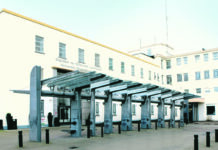
A RETIRED nurse manager at University Hospital Limerick (UHL) told Aoife Johnston’s inquest today (Monday) that the hospital was akin to a “war zone” and was “unsafe” for patients on the night the 16-year-old teenager presented there.
The teenager from Shannon, County Clare, eventually died of sepsis at the hospital after waiting on a chair for 12 hours before been seen by a doctor.
Katherine Skelly, a clinical nurse manager at the emergency department (ED) at UHL, with 23 years’ experience, provided a stark insight into the chaotic scenes inside UHL over that weekend.
Ms Skelly said the hospital was overwhelmed due to an influx of acutely ill patients who presented with multiple fractures during a severe weather freeze alert.
She said the “crisis” which unfolded at the hospital was “very clear and alarming”.
“What I observed was akin to a war zone. Every available floor space was taken up, trollies were lined up next to each other blocking doors.”
“Paediatrics was grossly overcrowded. The seven bays in Resus were all full, plus there were seven more patients there on the floor space, some were attached to defibrillators.”
“We were in a crisis situation. It was a major incident status in my opinion.”
In a SOS call to a more scenario nurse manager, she said: “This is a major emergency, we need help.”
She requested trolleys be sent out of the ED and onto wards, but this was not done.
Ms Skelly said there were 67 “Category 2” patients in the ED, including Aoife, who she agreed she deemed to be “dangerously ill”.
She said Ms Johnston and these 66 other patients were waiting more than 10 hours to see a doctor, when the recommend standard waiting time for Category 2 patients was 15 minutes.
She said she telephoned an on-call consultant and told him of the risks to patients and asked him to come to the emergency department, but she said “he declined my request”.
Another consultant initially declined to come to the ED but arrived later on.
‘Dying in front of the staff’s eyes’
“Resus was alarmingly unsafe,” Ms Skelly said.
When finishing her shift on December 16, 2022, the night before Aoife presented at the hospital, there were “130 patents” in the ED, she said.
Ms Skelly said she had expected the situation would have been “de-escalated” upon her return to work the following night but it had not and “there were 160 patients” in the ED.
She requested staff support as there were “15 nurses” on duty in the ED and Resus area, when, according to the recommended standards, “there should have been 20 nurses” on duty.
“We could have done with 30, such was the volume of patients,” she said.
Three nurses were assigned to Resus when the “minimum cover” is four.
When Aoife Johnston presented with sepsis with her parents, she lay across two chairs together because there were no trolleys available.
Ms Skelly described how patients were sandwiched together cheek by jowl on trolleys, some, including children, were “sitting on the floor” due to a lack of space.
All the while, Aoife Johnston was “dying in front of the staff’s eyes”, said Damien Tansey, senior counsel for the Johnston family.
Ms Skelly said it was her opinion that the paediatric area was “unsafe”.
She said she did not take any of her allocated break times as she and other staff members were under “constant pressure”.
“I literally did not have a moment to draw my breath,” she said.
Ms Skelly said the told her superiors that the department was “clinically unsafe” and that “the risk to patient safety was at a level I had not encountered before”.
‘It absolutely broke me professionally and personally that that poor girl died’
She told how patient handovers between nurses coming on and off shift was “constantly interrupted by patients and patients’ families”.
“Some were extremely abusive because of the long waiting times, staff were constantly looking for support, security guards were ringing about hostile patients.
“Some patients were horrified when they were told they would not be seen until the following morning.”
Ms Skelly said she asked a senior doctor to stop attending fracture patients and attend a child who was waiting 12 hours with suspected serious abdominal trauma.
She said she told the doctor they “could not stand over” a child waiting 12 hours while fracture patients were being attended to.
Ms Skelly said she asked that some trauma patients be transferred to Croom Orthopaedic Hospital in County Limerick to ease pressure on UHL, “but in spite of this we came on to the same crisis the following night with 190 patients on trollies”.
Staff were working under “unimaginable stress” and some patients received “substandard care”, while others simply “left the hospital without getting treatment”.
Ms Skelly told the inquest: “We have become too accustomed to the (overcrowding) crisis at UHL.”
She said she and some of colleagues had long warned about the risks of overcrowding to patients’ lives.
“Given the staff deficits in the emergency department, it was not possible to carry out our role in a comprehensive way. Overcrowding is the norm.”
She said these “significant deficits” in staff numbers in were both “permanent” and “temporary”.
“So no roster/shift would be fully staffed”, she said, and staff would be on “acute sick leave”.
She said a patient suspected of having sepsis should have gone straight to the Resus room.
Ms Skelly told Mr Tansey that she had been devastated by Aoife Johnston’s death and left her job at UHL because of it: “I never worked in A&E after that weekend.”
“It absolutely broke me professionally and personally that that poor girl died”.
Triage nurse
Another witness, nurse Ariane DeGuzman, said she triaged Aoife after she presented at the hospital and escalated her concerns about sepsis, as well as GP referral letter querying sepsis, to a doctor at the Resus Department but Ms Johnston was not admitted there.
A deposition on behalf of nurse Ciara McCarthy, who was also involved in Aoife’s care, was read into the record in which it was heard she was not aware initially that Aoife was a suspected sepsis patient.
Ms McCarthy said she grew concerned about Aoife’s condition as it worsened and she had asked emergency medicine registrar Dr Mohamed Hassan, who was working in Resus when Aoife arrived at the hospital, if he would see her.
Ms McCarthy stated Dr Hassan told her he suspected Aoife had a viral infection and for Ms McCarthy to administer paracetamol.
She said she asked Dr Hassan if he could come and review Aoife but he told her he was “busy” with other patients.
Dr Mohamed Hassan gave evidence that he was not involved in Aoife’s care, and he said he could not recall having a conversation about Aoife with Ms McCarthy.
He said doctors in the ED could have prescribed her with life-saving antibiotics and that Aoife would not have needed to have been in Resus to get this medicine.









